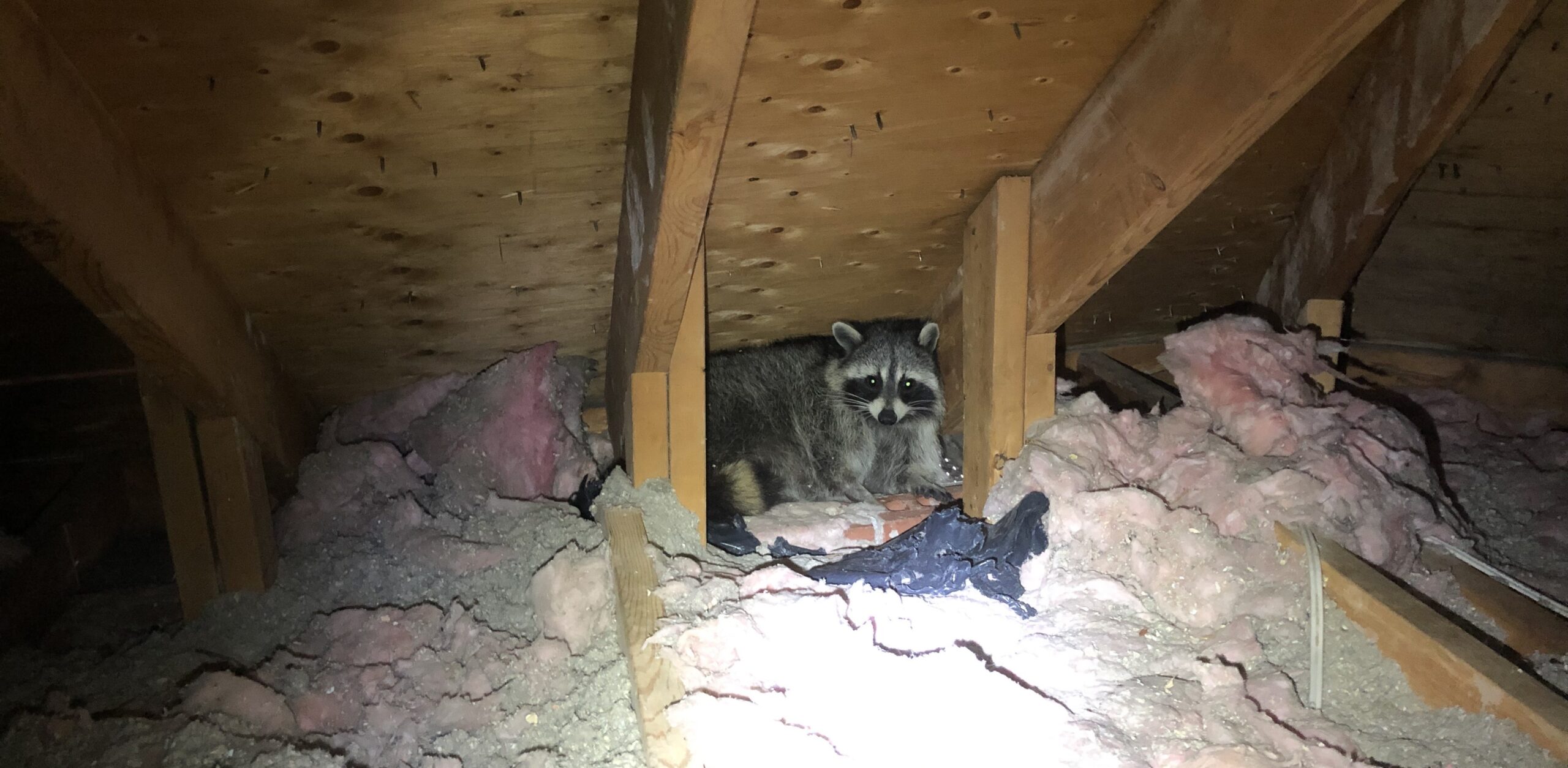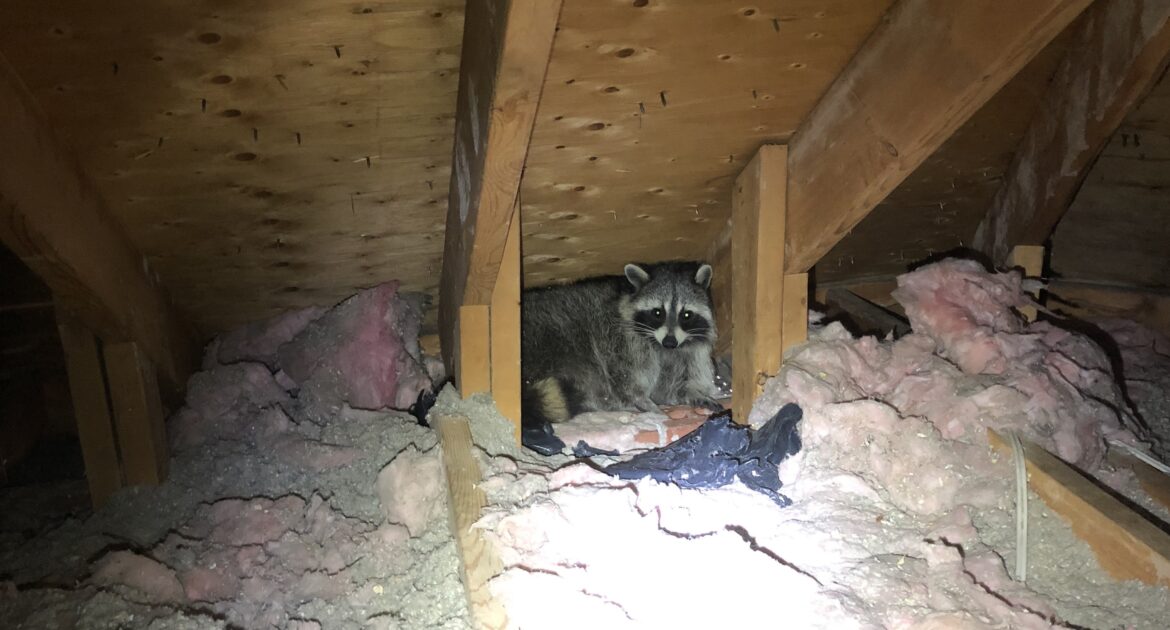If you’ve noticed raccoon droppings cropping up on your deck, roof, or lawn, you’re not alone. Waking up and finding a raccoon has left droppings in your yard or on your deck can be a frustrating problem for homeowners in Littleton and beyond.
Many people wonder why raccoons choose their property as a nightly restroom and, more importantly, how to prevent these unwelcome messes. Understanding why raccoons poop outside your home and learning methods to prevent raccoon messes can help keep your home and yard clean and safe. So, continue on below to learn from our experts in wildlife control in Littleton.
Why Raccoons Poop Outside – The Latrine Habit
Raccoons are intelligent and surprisingly organized animals. One of their most notable habits is their commitment to using latrine sites. A latrine is a designated area where raccoons repeatedly go to the bathroom, typically choosing outdoor spots that provide easy access and some level of safety or convenience. Common locations include:
- Roofs
- Decks and patios
- Gardens
- Base of large trees
- Sheds or similar sheltered spaces
Why do they do this? Raccoons instinctively avoid soiling the areas where they sleep or eat to keep their dens clean. Instead, they establish these latrine sites to manage their waste. Unfortunately, your well-maintained property might seem like the perfect latrine site to a raccoon.
Their choice of your property could be due to:
- Easy access points (e.g., low roofs or open decks).
- Areas that are undisturbed at night.
- Close proximity to food and water sources, such as garbage bins or bird feeders.
This behavior is consistent night after night, making the problem worse as time goes on.
The Health Risks of Raccoon Droppings
Before addressing the cleanup and prevention steps, it’s essential to understand the health risks associated with raccoon droppings. Raccoon feces can carry harmful parasites and bacteria that pose risks to humans and pets. The most dangerous is Baylisascaris procyonis, or raccoon roundworm, which can severely affect humans if eggs from the feces are accidentally ingested.
When cleaning raccoon droppings, airborne particles can also potentially spread leptospirosis, giardiasis, or salmonella. Use proper safety precautions, such as wearing gloves and a mask, and disinfect the area thoroughly after cleanup to avoid these health hazards.
Remember, proper cleanup doesn’t just protect you and your family; it also prevents attracting other animals to the area, reducing the ongoing problem.
How to Prevent Raccoon Droppings at Night
Stopping this issue requires a combination of deterrents, cleanup strategies, and behavioral interference. Below are actionable steps you can take to prevent raccoon messes on your property:
- Remove Food and Water Sources
Raccoons are opportunistic feeders. Eliminating food sources around your home can discourage them from sticking around.
-
- Secure your trash bins with animal-proof lids.
- Avoid leaving pet food or birdseed outside overnight.
- Clean up fallen fruit from trees.
- Remove standing water or install motion-activated sprinklers to deter visits.
- Block Access Points
Raccoons are skilled climbers, and they can squeeze into surprisingly small spaces. Inspect your home and yard to identify potential entry points, such as gaps in your roof, attic vents, or under your deck. Seal these areas with durable materials like heavy-gauge mesh or metal flashing to keep wildlife out.
Consider installing barriers on trees or poles that raccoons use to access your roof or deck. Simple modifications like tree guards or smooth metal sheets can make climbing more challenging for these animals.
- Shift Their Routine
Breaking their established habits can push raccoons to search for alternative latrine sites.
-
- Rearrange outdoor furniture frequently; consistency is what makes a spot appealing to raccoons.
- Place planters or heavy objects where droppings are commonly found to block their usual nesting spots.
- Try using double layers of painter’s plastic or garbage bags in latrine areas; raccoons dislike walking on these surfaces due to their sensitive paws.
- Use Deterrents
Natural or electronic deterrents can prevent raccoons from using your property as a toilet.
-
- Motion-activated sprinklers deliver a short burst of water when movement is detected.
- Lights or noise machines can scare raccoons away, though some clever raccoons may adapt to these over time.
- Clean Existing Latrine Areas Properly
Thorough cleanup is critical to erasing the scent of raccoon droppings, as the smell encourages them to return to the same spot.
-
- Wear gloves and a mask to protect yourself during cleanup.
- Spritz old, dried droppings with water before handling to limit airborne dust.
- On solid surfaces like decks, consider steam-cleaning to remove all residues.
- On soil or garden areas, turn the soil over or add topsoil to cover the site.
- Be Persistent
Some preventative measures need to be repeated to achieve results. Raccoons are persistent creatures and may return several times before they are discouraged enough to move on. Consistency is the key to success.
When to Call Skedaddle for Raccoon Removal Services
Raccoons can become a significant nuisance if they take up residence in or around your property. While some preventative measures and basic deterrents can address minor activity, certain situations call for professional intervention. Skedaddle Humane Wildlife Control in Littlton is here to provide reliable and humane raccoon removal services, ensuring your home and family remain safe and secure.
Signs It’s Time to Call the Experts
- Raccoons Inside Your Home
If raccoons enter your attic, walls, or basement, it is critical to address the situation immediately to prevent structural damage and protect your household. You may notice scratching noises, unpleasant odors, or visible entry points. Skedaddle specializes in safely removing raccoons from inside buildings without harming the animals or causing additional damage.
- Persistent Raccoon Activity
If raccoons continuously return to your property despite efforts to deter them, it may indicate a deeper issue such as an accessible food source or an insufficiently secured area. Our team will assess your property, identify vulnerabilities, and implement long-term solutions tailored to your specific situation.
- Property Damage
Raccoons are intelligent and resourceful creatures that can cause significant property damage, such as torn shingles, ripped soffits, or destroyed gardens. Prompt action is necessary to mitigate further issues, and Skedaddle’s professionals are equipped to repair damage while preventing future incursions.
- Health and Safety Concerns
Raccoons can carry diseases such as rabies and raccoon roundworm, which pose serious health risks. If you notice raccoons behaving oddly, showing aggression, or leaving droppings around your property, it is vital to contact experts who follow strict safety protocols and use humane removal techniques.
Skedaddle’s highly trained team offers comprehensive raccoon removal services, focusing on humane wildlife control and exclusion to protect both people and animals. Call us today to create a safer environment and reclaim your property with peace of mind.
Take Back Your Nights
Dealing with raccoon droppings at night can be a frustrating and messy issue, but with the right strategies, it’s a problem you can solve. By identifying why raccoons poop outside, addressing their preferred locations, and taking measures to prevent these messes, you can reclaim your property.
Need assistance protecting your Littleton home? Contact Skedaddle for expert advice and humane solutions to keep raccoons off your property for good.




